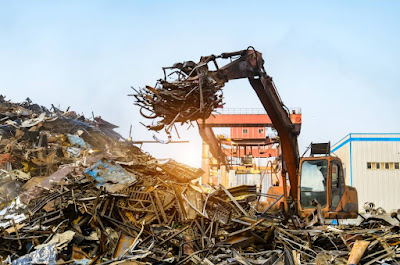Effective construction scrap management involves a comprehensive approach that encompasses understanding, sorting, recycling, partnering with reliable buyers, reducing waste, and implementing robust plans. For instance, in the context of trusted scrap metal in Marietta, it is essential to recognize different types of construction scrap such as metals, wood, concrete, plastics, and cardboard, and identify primary sources of waste in the construction process to target reduction efforts effectively. Here’s a detailed strategy outline:
Understanding Construction Scrap
Types of Scrap: Recognize the different types of construction scrap such as metals, wood, concrete, plastics, and cardboard.
Sources of Scrap: Identify the primary sources of waste in your construction process to target reduction efforts effectively.
Sorting and Separating Scrap
On-Site Sorting: Implement sorting stations on-site to separate different types of scrap as they are generated.
Color-Coded Bins: Use color-coded bins or labels to distinguish between materials like metals, wood, and recyclable plastics.
Scrap Metal Recycling
Identify Recyclable Metals: Common recyclable metals include steel, aluminum, copper, and brass.
Segregation and Storage: Properly segregate metals and store them in designated containers to prevent contamination and maximize recycling efficiency.
Find a Reliable Scrap Metal Buyer
Research Buyers: Look for reputable scrap metal buyers who offer fair prices and reliable service
Evaluate Services: Consider factors such as pickup services, payment terms, and the buyer's track record in the industry.
Partner with a Scrap Metal Company
Long-Term Relationships: Establish long-term partnerships with scrap metal companies to ensure consistent and reliable recycling services.
Contract Agreements: Negotiate contract agreements that outline the terms of scrap collection, pricing, and services provided.
Reducing Waste through Prefabrication
Modular Construction: Use prefabricated components to minimize on-site waste and improve construction efficiency.
Standardized Materials: Opt for standardized material sizes and shapes to reduce off-cuts and excess material waste.
Implement a Waste Management Plan
Comprehensive Plan: Develop a detailed waste management plan that outlines strategies for waste reduction, recycling, and disposal.
Goals and Targets: Set specific goals and targets for waste reduction and recycling to measure progress and success.
Training Workers on Waste Management
Educational Programs: Conduct regular training sessions to educate workers on the importance of waste management and proper sorting techniques.
Incentive Programs: Implement incentive programs to reward workers and teams who excel in waste reduction and recycling efforts.
Reusing Materials On-Site
Material Reuse: Identify opportunities to reuse materials such as concrete, wood, and metals within the project site.
Creative Solutions: Encourage creative solutions for reusing scrap materials, such as using off-cuts for smaller components or temporary structures.
Donating or Selling Unused Materials
Material Donation: Donate unused or excess materials to local charities, schools, or community projects.
Resale Opportunities: Sell unused materials to other construction projects or through online marketplaces.
By implementing these strategies, construction projects can effectively manage scrap, reduce waste, and promote sustainability while also potentially lowering costs and improving operational efficiency.





No comments:
Post a Comment